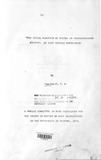| dc.description.abstract | When one considers the position of oral
poetry in Africa, an obvious element that emerges
is that this medium of expression takes the form
of a collective acti vi ty from time immemorial,
it has been expressed at funerals, marriages, childnaming
and other ceremonies. An instant, collective
response is achieved because generally, oral poetry
is expressed through a language and an idiom which
the .entire community understands .
There is much of this collective activity
which has been lost throughoute written form.
Written poetry is a recent innovation in Africa and
one which requires the participants to have acquired
reading skills through the existing educational
system. In other words,written poetry has assumed
a class form in that it is written for the elite.
Consequently, a majority of this people are cut off
(partly through the use of English language or any
other foreign language and partly through characteristics
,of obscurity associated with formal education.
It is the above artistic development which inspires
one into the evaluation of writ ten poetry in its
modern context in the communication line between the
poet and the public.
In the first part of my thesis, I have
elaborated on the social role of -oral poetry and
how negritudist poetry emerged more or less for
a similar purpose. I have examined critics who,
although paying due respect to the poetry of the
Negritude Tradition, feel that the time for Africa
to glorify its past is long gone. There is now an
urgent need for African poets to face the existing
social and economic reality as genuinely as possible.
The voice of the poet should also be the voice of
the masses. In fact, this is the major point of
consideration which this thesis undertakes.
The second part of my thesis therefore,
exarrd.ne s two poets, Taban L0 Liyong and John Mbi ti,
who,in my opinion, are anti-social. Taban L0 Liyong's
pOetry, for example, is at times too persanalised
and obscure to have any social hearing. Such poetry
serves no useful purpose in a society which is
threatened to extinction by neo-colonialism. Even "- John Mbrti's poetry which glorifies the heavenly
kingdom can be regarded as being escapist and therefore,
"badly fitted to the plight of the masses. But the
-attempt''of the two poetsin at least writing some
poetry is appreciated.
The third part of the thesis examines
Richard Ntiru and Jared Angira since the two poets
have their arms spread in both the private and the
public domain. The social obligation of the two
poets has been put to question since the private
domain seems to dominate their artistic efforts.
In fact, Angira's poems, for example, appear to
develop into more obscurity from Silent Voices,
to Soft Corals. The argument here is that poets
need to re-exhamine their social situations much more
consistently.
The fourth part of the thesis takes up from
the shortcomings of Ntiruand Angira to show r.ow,
to a large extent, Okot p'Bitek and Okello Oculi
have paved the way for a meaningful poetic expression.
It is, for example, argued LhGt although Song of
Lawino glorifies the past, there is a sence in which
it appeuls not only to the Acoli background, but
also to the entire East African context through the
Lauqu aqe and imagery used , Okot p'Bitek's and Okello
Oculi'poetry (particularly the former's Song of
Prisoner and the latter Malak) justify what this
" thesis regards as liThe Social Function of Poetry"
in medern context .
The conclusion of this thesis has noted
the stages of artistic development which East
African poets are going through. The graph line
begins from the oral art forms, through Taban,
Mbiti,Ntiru and Angira up to the point where Okot
p'Bitek and Okello Oculi are now. The purpose
has been to determine the logical development of
East African poetry ill order to identify a convenient
direction which would require more emphasis. In
this respect, the conclusion bas considered a
number of limitations, such as illiteracy, and has
gone further to suggest ways and means of narrowing
the present gap between the poet and his pub:ic.
For example it is suggested that a programme of
mass education, if it is implemented, would offer
h wider readership of the written works of art.
This would be reinforced by public dramatizations
of poetry in order to maintain a necessary link
between the oral art forms and the written art forms.
TIle more the poetry is removed from the masses to the ivory towers of the elite, the more we deny the
cowntrodden a creativity which can mobilize them
" and restore them to the base of collective activity.
Okello Oculi's Malak seems to give much
more appropriate illustration of a poet's social
commitment. The poet addresses himself to
imperialism and the class struggles which disable
our societies and he does this without any divided
loyalties. In a confident way, Oculi charts out
the plight of the suffering majority in as far as
this class of peasants and workers benefits very
little (if at all) from the national wealth. He
seems. to strongly appreciate the peasant labour which
sustains nations. It is for this reason that he
seec "Ujamaa' - socialism - as the only salvation
in that, within this system, the welfare of the
cornmon man is given priority in national planning
policies. However, Malak is considered as only a
beginning. It is considered as ar.opening into a
whole new territory of meaningful poetry on the
East African literary scene. It is, therefore,
regarded as a big challenge for the future developme
nt; of East African poetry. | en |

